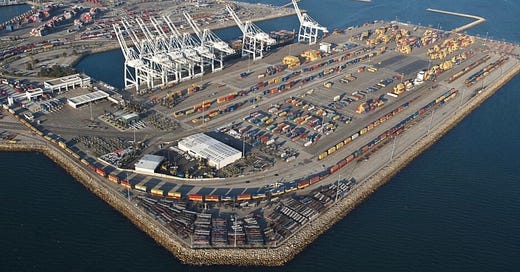Blinken’s “begging trip” to PRC; Iran & India moving forward on Chabahar port; Increase of Chinese exports to Iran
Prohibited Transactions for the week of 19 June 2023 (#9)
North Korea
US Secretary of State Antony Blinken called on Beijing to use its influence to convince “Pyongyang to engage in dialogue and to end its dangerous behavior.” Beijing responded that “All parties need to face the crux of the issues squarely,” and has been pushing for a return to the Six Party Talks. North Korea commented that Blinken’s trip was nothing more than a “disgraceful begging trip of the provoker admitting the failure of the policy of putting pressure on China.”
It appears Pyongyang asked for Chinese help to salvage the wreckage of the recently launched North Korean rocket. //As discussed in issue #8, the PRC has an interest in securing the debris in case any Chinese components made their way into the rocket or satellite. For Pyongyang, the risk includes exposing the DPRK’s broader supply chains to the world.
North Korean trade with the PRC dropped five percent from April to May — to USD189 million — due to a decline in Pyongyang’s exports.
Chinese-flagged floating cranes appear to have participated in ship-to-ship transfers with North Korean cargo vessels outside of Nampho, the DPRK’s largest port.
An increase in oil imports from the PRC and Russia led to a drop in gasoline and diesel prices in North Korea.
US President Joe Biden declared a continuation of the national emergency regarding North Korea.
Iran
According to Iranian media, Oman has come up with a proposal — approved by Tehran and Seoul — regarding the USD7 billion being held in South Korea banks. An Iranian lawmaker said “We hope that this proposal will be implemented.” //Left unstated is that the implementation — by the South Korean banks and government — of the undefined proposal will depend on Washington’s approval.
Iran’s hope to become a regional transport hub is tied to the completion of the International North–South Transport Corridor (INSTC), along with other projects such as the development of the Chabahar port. The country’s northern and southern ports have the capacity to move 270 million tons of goods annually. Once the INSTC is fully operational, Tehran could earn USD20 billion annually from the route, provided sanctions don’t force shippers to bypass Iran.
Iran and India have resolved legal disputes regarding Chabahar port (possibly related to an arbitration clause issue) clearing the way for approximately USD80 million to be invested in the port by New Delhi over the long term. //The port has an exemption from US sanctions allowing for the “continued use of Chabahar and for imports through Chabahar for development of the Chabahar port and for development of a rail line from Chabahar to the Afghanistan border”
Iran signed transport agreements with Uzbekistan, including the development of a multimodal “Uzbekistan-Turkmenistan-Iran" transport corridor. Tehran is also looking to expand its gas transit infrastructure to increase capacity to move gas between its neighbors. //All of this activity — from the INSTC to various bilateral and regional agreements Iran has been signing — are part of a broader strategy “to develop new energy partnerships and increase its oil exports.” These energy agreements and build-up of infrastructure provide Tehran with additional avenues to ignore or evade sanctions, but can also provide international banks with increased insights as to how Iran money illicitly moves through the formal financial system.
The UK government is launching a probe into allegations that British universities helped Iran develop technology which can be used by Tehran’s drone and fighter jet programs.
The original investigation noted that staff at 11 British universities produced at least 16 studies with potential applications for Iranian military projects.
Trade between Iran and the PRC was USD6.5 billion for the first six months of 2023, which is unchanged from the same period last year. Beijing exported USD4.6 billion worth of goods to Iran, a 40 percent increase over the same six-month period in 2022, and Tehran exported USD1.9 million to the PRC, a 68 percent year-on-year decrease.



